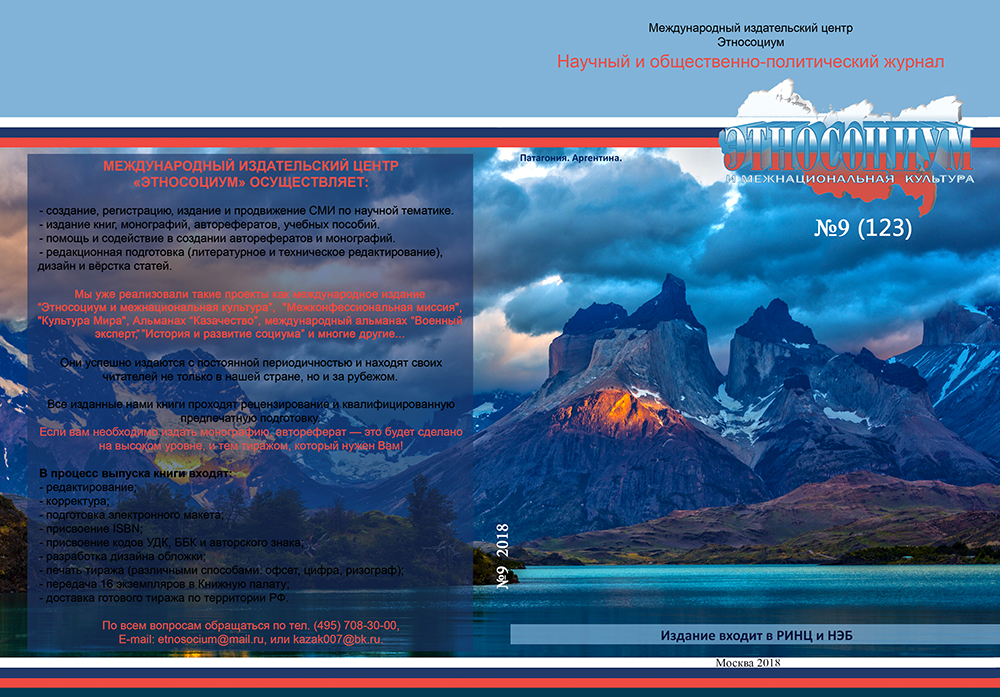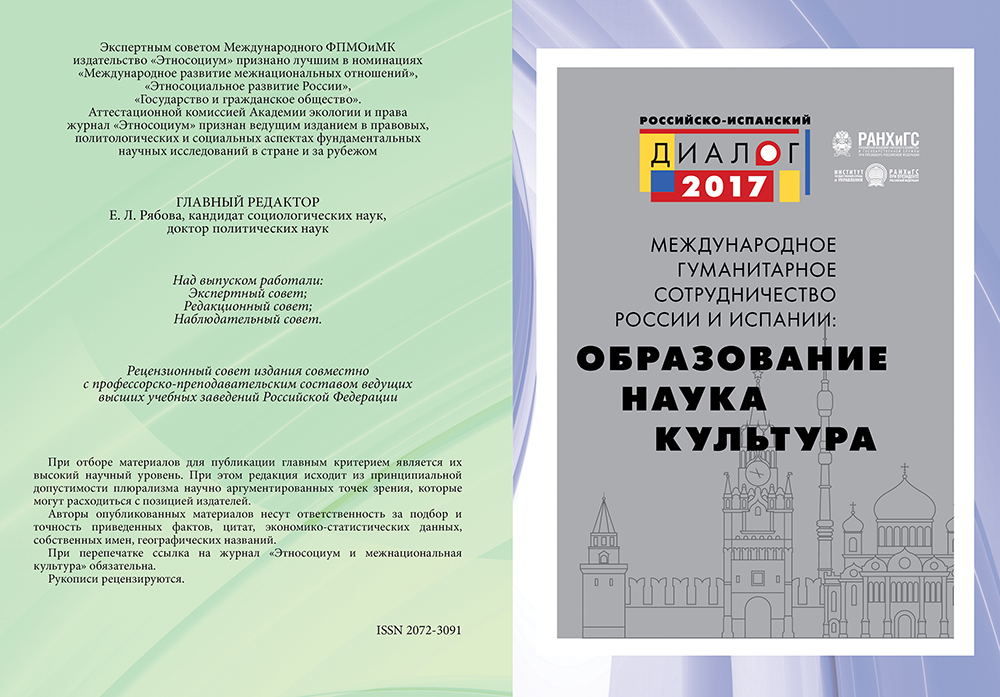

Content
|
COUNCIL OF INTERNATIONAL RELATIONSHIP
|
|
|
Letunovsky P.V., Vostrikov S.V. Russia on the background of migratory transformations
|
9
|
|
Mikhaylova N.V., Abdel Jalil N.A. The impact of migration processes in the border regions of Central Russia in the national security of Russian Federation
|
18
|
|
Yushin I.V. Blockchain technology in the modern economy: prospects and vulnerabilities entailed
|
25
|
|
ACTUAL PROBLEMS OF MODERN SOCIETY:
POLITICS, ECONOMICS, LAW
|
|
|
Amelin E.V. Restoration culture and competence of the restorer-builder
|
38
|
|
REGIONAL STUDY:
POLITICS, ECONOMICS, LAW
|
|
|
Karashpai S.M., Sat A.V., Sadi S.S., Mongush A.A. Family values of the population of the Republic of Tuva
|
45
|
|
Lukyancev A.S. Russian political and economic modernization between modern and postmodern
|
49
|
|
Popov A.V. Mechanisms and tools of media influence on the formation of public opinion in Russia and in the world
|
62
|
|
Semedov S.A., Maluchiev G.S. Caucuses wedding as a crazy (unnormal, ugly) result of the philosophy of the society of consumption
|
70
|
|
Shchegolkova E.Yu. The activities of the national-cultural associations in the poly-ethnic regions of Russian: the example of Bashkortostan and Khanty-Mansiysk Autonomous district (Yugra)
|
85
|
|
Dzutsev K.V. Ethnographic essay on the life of the village of Laba (On the history of abrecheism of the late XIX - early XX centuries.)
|
104
|
|
Shakhin Y.V. Neoliberal pension reforms and social state alternative
|
111
|
|
Osadchuk O.A. Condition, dynamics and causes of crime of female minors in the Russian Federation (federal and regional level)
|
117
|
|
INTERNATIONAL RELATIONSHIPS:
POLITICS, ECONOMICS, LAW
|
|
|
Tambi S.A. To Comrade Makhmastal, the Ship and the Man
|
123
|
|
NEWS
|
|
|
Zorin V.U. and Alexander Brod Protest sentiment attracts xenophobia
|
152
|
|
Zorin V.U. and Vera Suprun
|
155
|
|
Abstracts
|
158
|
|
Authors
|
169
|
|
Requirements to materials submitted to the international publishing house "Etnosocium"
|
173
|
The article focuses on the actual problems of transformation of migration processes both in Russia and outside it; analysis of risks and threats associated with the migration crisis; the development of possible measures and actions to ensure national security in the emerging conditions.
Keywords: migration, refugees, resettlement, illegal migrants, enclaves, visas, national security.
The article analyzes the regional migration processes in the border regions of Russia. The attention is focused on the formation of a competent migration policy pursued at the regional level, on which the socio-economic development of society and the security of the region depends. In order to develop an adequate state migration policy, a qualitative assessment of the migration situation at the regional level is necessary. The study defines the essence of migration security, which consists in the possibility of movement within the country and abroad, the preservation of ethnic and cultural identity and homogeneity of society. It is determined that regional migration processes and regional security have a direct impact on the national security of the state.
Keywords: migration policy, regional migration processes, migration security, national security.
Information and economic security are among the major issues that make digital economy vulnerable. Blockchain can serve as an example of how to solve these problems. But the solution itself is by no means final and requires additional research and development. What makes it problematic is interdisciplinary in nature since the task blockchain is charged with implies ensuring both economic and information security. The former is well shaped verbally but lacks formalized mathematical criteria for both valuation and evaluation. Objective and reliable assessment of the state of economic and information security can only result from the thorough processing of large volumes of statistical information based on well-attested algorithms of mathematical modeling and forecast. The basic solution of the tasks in question is believed to hinge on the new technologies of machine learning and artificial intelligence. The following research is hoped to produce mathematical methods and algorithms for assessing and forecasting the state of information and economic security.
Keywords: digital economy, security, information security, economic security, blockchain, machine learning, artificial intelligence, economic and functional risks, investments, information, information space.
The article analyzes the scope of competences of the restorer-builder, due to the complexity, complexity and exclusivity of the works. The peculiarities of the development of the restoration work at the present stage and the requirements imposed on the competence of the restorer-builder are explored.
Keywords: cultural heritage, historical monument, restoration, conservation, restorer-builder, competence.
The article presents the main results of a sociological study conducted in the Republic of Tuva, in order to study the family values of the population. In the system of value orientations of the inhabitants of the republic, the family and children occupy the first positions. The most important family values are emotional and psychological values.
Keywords: family, family values, family traditions, holidays, children, Republic of Tuva.
The formation of a discursive reality in political theory and practice occurs through the implementation of various strategic courses focused on the program of positive changes. However, the political decisions taken should first of all be systemic in nature, because their feasibility will be subject to doubts from both the authorities and experts, as well as experts, social and political movements, and other interested actors.
In this article, we will have to figure out how the Russian system of political and economic planning and forecasting is capable of creating autonomous and efficiently working structures of the modern and the postmodern.
Keywords: modernization, strategic planning, state policy, modern, postmodern, post-structuralism, postmodernism.
The mass media are considered as the most important institution for shaping and influencing public opinion, which is facilitated by a wide public coverage, the variety of communication channels involved, and the availability of a variety of tools for information and communication that provide a large-scale impact on individual and mass consciousness. As a result, the media as such a subject of information power can influence the formation of public opinion, and its status is reinforced by the fact that they are both an information channel and a message transmitted through this channel.
It is stated that the impact of the media on public opinion in societies of different types occurs in different ways. At the same time, in the West the media has long been used as one of the key tools for manipulating public opinion, which is facilitated by the continued high confidence in the media. At the same time, the media often become subjects of information wars, into which they are drawn by owners closely associated with financial and industrial clans. In a society of the eastern type, the unquestioning confidence in information retransmitted by the media led to the fact that the malicious forces could use the “new media” as a tool for the “Arab spring” revolutions.
Analyzing the influence of the media on the formation of public opinion in Russian society, the author notes that the domestic model of the organization of information and communication space is based on the growing pragmatism of interaction between key actors, the constant improvement of information quality and social responsibility of media editors and owners. It is stated that in modern Russian conditions, the frenzied and uncontrolled influence of the media on public opinion is replaced by a planned, within the legal framework, management of public opinion, realized through its identification and moderately active design.
It is stated that the most important tools and mechanisms for shaping public opinion through the media are large-scale public discussions involving experts from the expert community, impact through “opinion leaders”, the active use of interactive technologies and the combination of information impact through “traditional” and “new” media.
Keywords: public opinion, civil society, interaction of government and government with civil society institutions, public associations.
Wedding nowadays is a notion that includes rather complicated reflection of the development of modern society, some kind of an indicator that shows the level of culture of socium. Transformation of wedding ceremony demonstrates the changes in society and it’s important to determine the vector of society development. This article deals with the transformation of wedding ceremony in Dagestan. Authors analyzed modern wedding rituals and made up a conclusion that weddings demonstrate the philosophy of consumption that nowadays starts to dominate in Dagestan society. On the other hand, the modern Dagestan society preserve the archaic features that go along with postmodern culture. Authors consider this phenomenon as the process of glocalisation with its negative and positive features.
Keywords: Dagestan, wedding, tradition, ceremony, status of the family (tribe), prestige, Muslim wedding ritual, tamada.
In article considers the main activities of the national-cultural associations provided by the doctrinal documents, and their role in maintaining of interethnic accord.
Keywords: national-cultural associations, interethnic relations, interethnic accord.
The article examines the reasons for pension reforms in a number of former Soviet republics. The author considers them to be a neoliberal reaction to a drop in the rate of profit. The interrelation of pension reforms with demographic processes, labor productivity and employment dynamics is investigated.
Keywords: pension reforms, neoliberalism, labour productivity, employment.
In this article we are talking about the state and dynamics of juvenile delinquency females in the whole of the Russian Federation and in the newly annexed regions of Crimea and Sevastopol, where similar studies have not been carried out, in addition analysis of the signs and the social determinants of female juvenile delinquency.
Keywords: current state and dynamics of juvenile delinquency crime, female criminality, delinquent behavior, antisocial orientation, socialization.
The aim of the research is to tell the reader about little-known details of the biography of the famous Soviet diplomatic courier, Estonian, the native of Narva city Johann Makhmastal (1891-1942). The topicality of the work lies in the fact that February 5-th is acknowledged in Russia as the Day of Memory of diplomatic couriers who died while performing their duties. It transforms into a memorable day after the armed attack of 1926 on Soviet diplomatic couriers Teodors Nete and Johann Makhmastal. The novelty and uniqueness of this research is indisputable due to the fact that when writing it the author used the large number of materials from the National Archive of the Republic of Estonia, publications in Estonian and Soviet pre-war and post-war newspapers and magazines, books in Estonian and Russian languages. The author not only narrates the armed attack of 1926 (on which many authors concentrated in their works), but acquaints non-specialist audiences with almost unknown pages of the biography of the red diplomatic courier, and also considers the memorialization of the name of Johann Makhmastal in the USSR and Russia (on portraits, in literature, media, films, monuments, youth movements, at memorable events and on postal envelopes, in the names of ships and streets). The memory about the heroic diplomatic courier is alive in modern Russia and it is supported by the state.
Keywords: Estonians, diplomacy, Johann Makhmastal, diplomatic courier, pouch, valise, revolution, Bagaryak.